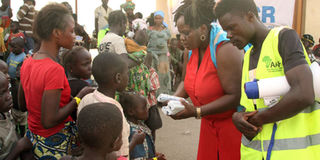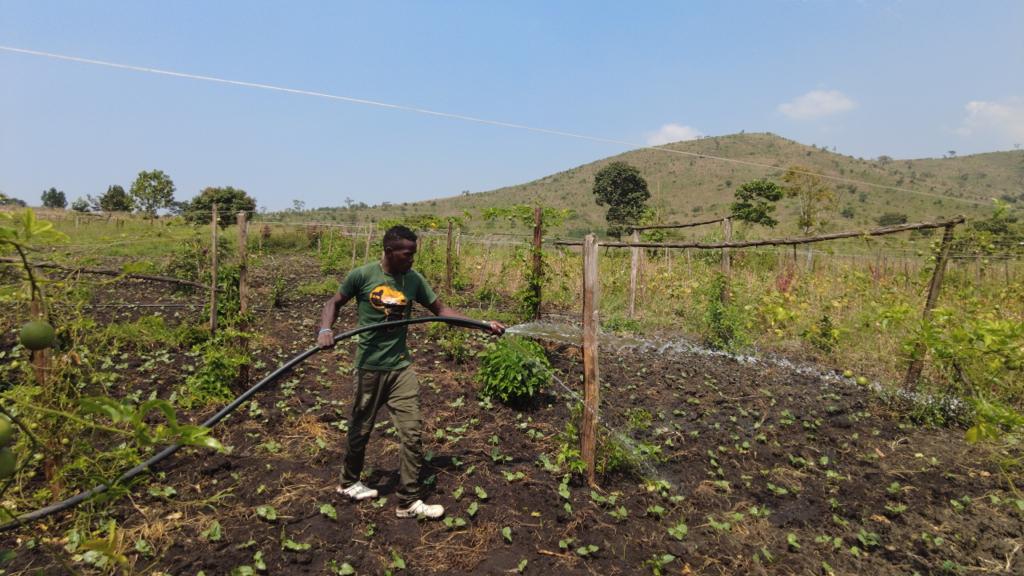Refugee influx overwhelms Kyangwali Settlement Camp

Humanitarian officials attend to children of Congolese refugees at Sebagro reception centre in Hoima District. PHOTO | FILE
What you need to know:
- Last week, the Leader of Opposition in Parliament, Mr Joel Ssenyonyi, tasked the Government to engage other neighbouring countries to support them in hosting refugees.
Kyangwali Refugee Settlement is overwhelmed by an influx of refugees as thousands continue to cross the dangerous waters of Lake Albert away from the war-torn Eastern Congo caused by the insurgencies from Allied Democratic Forces (ADF) and M23 rebels.
Others have come from Sudan and South Sudan as well and according to the United Nations High Commission for Refugees (UNHCR), the situation remains highly unpredictable.
Mr Frank Walusimbi, the UNHCR spokesperson, in a telephone interview with this publication on Sunday said since January, they have received 15,000 new arrivals, with over 3,000 from the Democratic Republic of Congo (DRC).
He added that those coming from DRC arrived through Kisoro, Bubukwanga Sub County in Bindibugyo District, and via Lake Albert.
“Our teams from UNHCR and OPM are on the ground in these places, receiving, screening and registering the new arrivals,” he said.
“In Kyangwali specifically, there are over 1,300 individuals. About 700 of these are at Kagoma Reception Centre, and we shall be relocating them on Tuesday. But like I've told you, the situation is very unpredictable,” he added.
Last week, the Leader of Opposition in Parliament, Mr Joel Ssenyonyi, tasked the Government to engage other neighbouring countries to support them in hosting refugees.
This was after the Vice Chairperson of Committee on Equal Opportunities, Ms Dorcus Acen, presented a report on floor of Parliament about the state of refugees and refugee hosting communities in Uganda.
In the report, the committee noted that the influx of refugees had led to encroachment on wetlands in the various settlements and recommended measures for natural resource conservation among others
Mr Walusimbi further expressed that the numbers could be bigger than this in the coming days.
“A significant number of them have been relocated to settlements in the southwest. These new arrivals are adding to the existing 1,580,000 refugees already hosted in the country, all against a backdrop of reducing donor support,” he said.
The Minister of ICT and National Guidance, Dr Chris Baryomunsi, in a telephone interview with this publication on Sunday said the fighting in DRC has also increased pressure on Lake Albert as those who flee turn to fishing as an economic activity.
“Most Congolese are taking advantage of that fighting and just cross into Uganda for economic fortunes especially targeting fishing on Lake Albert because you know government has put stringent measures to curb illegal fishing, so there has been regeneration of fish. Some come some disguising as if running away from the fighting yet there looking for opportunities,” he said.
“And when the officials on the side of Uganda ask them to register as refugees they refuse and dodge around,” he added
Uganda, is Africa’s largest refugee host country, providing refuge to over 1.5 million people.
Most refugees come from South Sudan (57%), the Democratic Republic of the Congo (32%), Somalia (3%), and Burundi (3%).
By the end of September 2023, 74,618 new arrivals were received and a total of 225,000 new arrivals have been received since 2022.
While most refugees have fled violence in South Sudan or the Democratic Republic of the Congo (DRC), the recent conflict in Sudan has resulted in a total of 6,262 new arrivals from Sudan.
According to the United Nations Office for the Coordination of Humanitarian Affairs Refugees (OCHA), Refugees in Uganda already receive the lowest level of food assistance in the region. The overall funding shortage is impacting the already limited livelihood opportunities and severely impacting food security.




